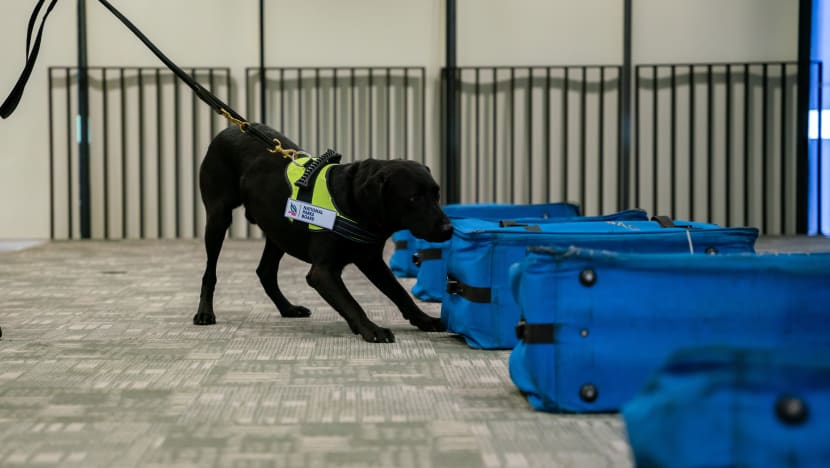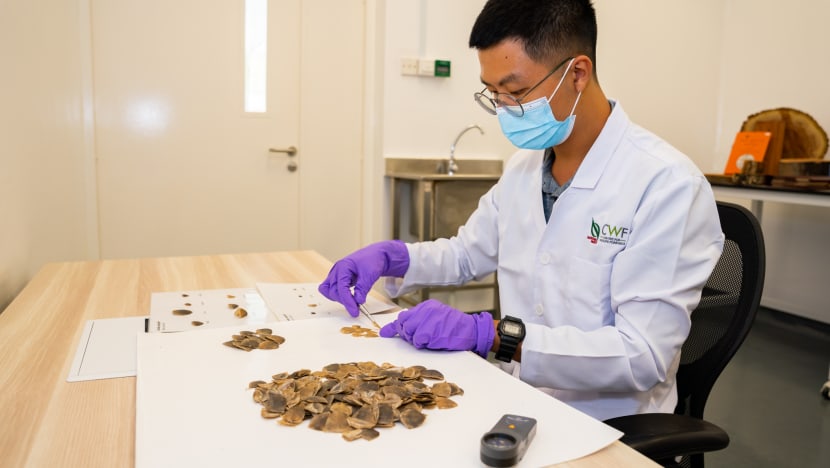New Singapore wildlife forensics centre to help tackle illegal trade as NParks launches K9 unit

A dog from the K9 Unit undergoes training to check for wildlife and wildlife products in luggage. (Photo: NParks)
- The Centre for Wildlife Forensics will identify the species of wildlife and its geographical origins to improvement enforcement against poaching and trafficking at source
- A new K9 unit will be deployed at Singapore's borders to sniff out illegal wildlife products like elephant ivory and pangolin scales
SINGAPORE: The National Parks Board (NParks) on Friday (Aug 27) officially opened Singapore’s first wildlife forensics centre to identify and detect the origins of seized wildlife and wildlife products.
“The illegal wildlife trade threatens the survival of endangered species and harms habitats and ecosystems all around the world,” said National Development Minister Desmond Lee at the opening.
The opening of the Centre for Wildlife Forensics comes a year after its initial launch. “Over the past year, we have enhanced our systems and equipment, and improved our sampling and testing methodologies,” said Mr Lee.
The centre will use DNA barcoding, and genetics and chemical analysis methods to identify the species of wildlife and wildlife products seized.
These tests can also trace the likely origins of the products, which will help Singapore’s regional and international partners improve enforcement against poaching and wildlife trafficking at source, said the minister.
This would go towards tackling the global issue of illegal wildlife trade, said NParks in a press release.
The centre can test both animal products such as pangolin scales and plant products like timber. Part of the centre’s work will involve the identification of timber species to “accurately identify” CITES-listed timber species, said NParks.
CITES is the Convention on International Trade in Endangered Species of Wild Fauna and Flora, an international agreement to protect endangered plants and animals. There has been a record amount of seizures of pangolin scales and elephant ivory in Singapore in recent years, with 8.8 million tonnes of elephant tusks and 37.4 tonnes of pangolin scales seized in 2019.
Related:

STUDIES ON IVORY AND PANGOLIN SCALE SEIZURES
Two studies on elephant tusk and pangolin samples aim to identify familial links in and across separate seizures. Both are being done in collaboration with conservation biologist Professor Samuel K Wasser from the University of Washington.
The study on elephant tusks analyses genetic linkages between ivory products seized between 1995 and 2019, while the study on pangolin samples looks to create a pangolin genetic reference map.
“The results of these studies will help us determine the likely geographical origins of the animals and how they are connected across seizures, to uncover the trafficking networks of the criminal organisations that trade in illegal ivory and pangolin scales,” said Mr Lee.
The findings will be shared with the international community.
NEW K9 UNIT
Mr Lee also announced that Singapore will begin using sniffer dogs to detect wildlife and wildlife products as part of increased enforcement measures at Singapore’s borders.
The unit has been specially trained to sniff out commonly trafficked products such as elephant ivory and pangolin scales.
“This will help us to crack down on illegal wildlife smuggling operations and do our part to disrupt the global supply chain of illegally traded wildlife and wildlife products,” he said.














